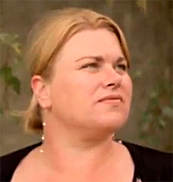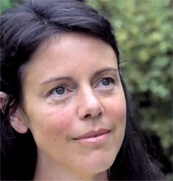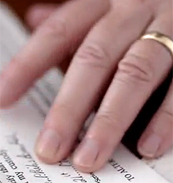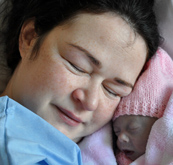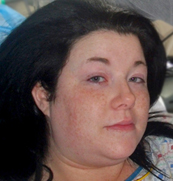Ambra Storm
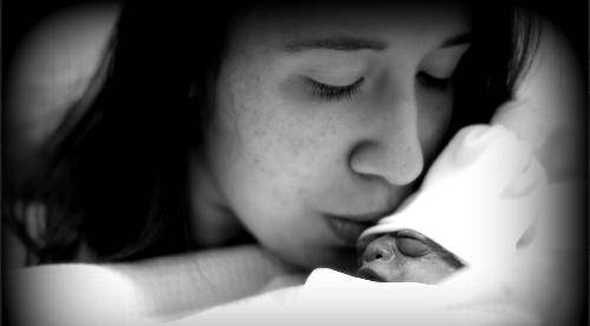
Our little storm!
Micah was just seventeen years old when she discovered she was pregnant. But abortion simply wasn't an option for her and her boyfriend, Kyle.
We were not ready at all but we both felt like we needed to take full responsibility for the baby growing inside of me.
Though they did not feel ready to parent a child, the couple soon began to feel a growing excitement about the baby growing inside of Micah. However, their excitement turned to fear and heartache when, at an 18-week ultrasound, they discovered that the baby Micah was carrying had a condition called anencephaly. This meant that their daughter had not developed a major portion of her brain, skull and scalp.
Doctors said she would not survive outside of the womb.
Micah's doctor immediately suggested abortion. And though Micah and Kyle refused at first, Micah confessed that for a week following the diagnosis, abortion actually seemed like the more attractive option. She feared that it would be more painful to carry the child to term and deliver a stillborn than to simply "terminate the pregnancy" at 18 weeks.
"I was carrying a baby that would more than likely not even be born alive. My daughter couldn’t survive outside of the safe haven I had created for her,” she said. “It took months before I came to terms with my decision to carry. I was constantly faced with questions. Why? How?"
Yet Micah began to understand the answers to these painful and difficult questions.
"Why? Because no matter what, she was my daughter. There was a life inside of me and I couldn’t just take that away from her. She didn’t choose to have this happen to her, so how could I choose to end her life to save myself from more heartache?
“How? Go on with every day life! The bottom line was simple: She was alive she had a life and it was my job as a mother to give her the best life she could possibly have."
Insensitivity of people
During her pregnancy, Micah was astounded at the insensitivity of people she encountered.
"Many people were so rude about the idea of carrying a baby that wasn’t meant to live outside the womb. The amount of comments I got like, 'why don’t you just abort?' People seemed to think by aborting it would be easier. It would somehow just go away, like it never happened."
But Micah knew that carrying her baby was the only option she had.

"I explained to them, 'I would rather endure the heartache that is surely to come if I carry her because at least I can give her a fighting chance.'"
Micah and Kyle decided to name their daughter Ambra Storm.
Micah began to enjoy her pregnancy. She recalls that the baby "always got scared at loud noises. This made football games not so fun for me. She was always so funny. She would kick a few times then stop for three minutes and then you would just see my belly bounce up and down. It was like there was a party going on in there!"
Micah's mother shared her own experience of watching Micah's pregnancy.
"There wasn’t a moment that Micah’s belly wasn’t moving around. We laughed a lot at Ambra’s tantrums. I struggled with how to be there for Micah. I could teach her how to be a mother, I could even show her how to be a good teen mother. But I didn’t know how to help her through this. We found that talking and laughing and crying all together was how we were going to handle this and that is what we did."
Due to an excessive amount of amniotic fluid, at 35 weeks, Micah began to find it difficult to breathe. The doctor ordered an induction.
"Looking back I think I knew something was wrong when I hadn’t felt Ambra move. She was a wild one most of the time! I didn’t want a fetal monitor on during labor because I didn’t want to know during labor if she passed away.
She has arrived
“After 20 minutes of pushing, Ambra was here. They quickly placed her on my chest and cleaned her off. No one spoke. I remember giving my mom a look and she nodded back at me. But the words ‘she’s gone’ never were spoken."
Micah and Kyle had three-and-a-half hours with their daughter. They were astonished to discover Ambra's beautiful and familiar features.
"Of course, like any mom I started counting her toes and realized she only had 9, then her dad pointed out they were like his feet. His pinky toe wraps under his other toe. I started laughing at how many of our features she did have. She had my black hair and her daddy’s long eyelashes and my cheeks and both of our long legs. She had my mother’s chin and my family’s nose."
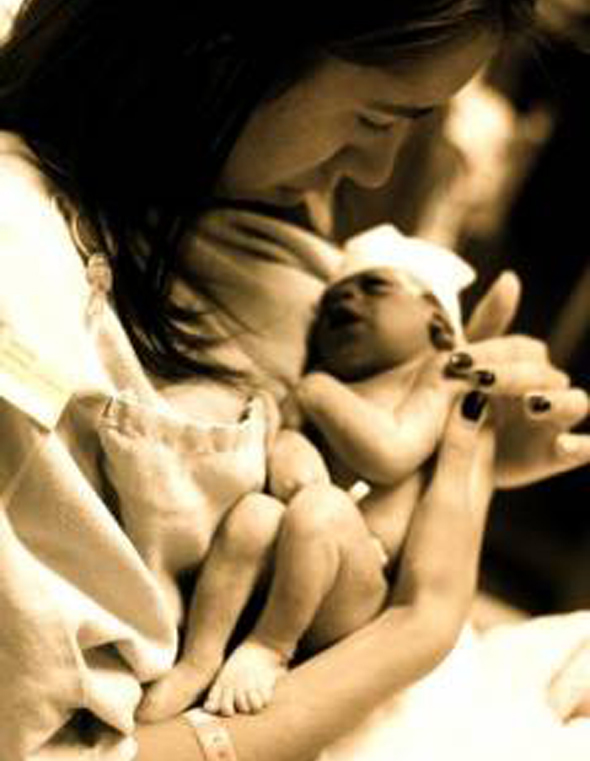
Ambra's funeral was held two days after her birth. Micah describes the event as a time of deep mourning, yet she maintains that she does not regret carrying and delivering her daughter.
"Throughout my pregnancy it was important for me to not mourn her. She was still alive and I wasn’t going to mourn her until she was gone."
Micah's mother also does not regret her daughter's choice to carry Ambra.
"I can’t even begin to explain what going through this journey with Micah has meant to me. I have a wonderful, loving, and beautiful daughter who gave birth to a beautiful baby girl, my first grandchild, Ambra Storm. This experience has brought us even closer as mother and daughter ... I am so proud of her."
So many young women in Micah's situation would choose abortion, simply because they did not feel they could face teen pregnancy and motherhood. And even more so because of the fatal anencephaly diagnosis. Yet Micah courageously defends her decision to carry and give birth to her daughter and encourages other young women in similar situations to do the same. She has also devoted her life to sharing the pro-life message in honor of Ambra.
"I got to meet my daughter, to hold and kiss her. I couldn’t imagine not being able to share those few hours with her. Even to this day when I share my stories doctors, mothers of many children, fathers and strangers will ask, 'why not abort?' It saddens me that this is the way we think. I still continue to fight for her and all the babies that have been aborted."

- - - - - - - - - - - - - - - - - - - - - - - - - - - - - - - - - - - - - - - - - - - - - - - - - - - - - - - - -
ANENCEPHALY is a neural tube defect which means that the baby's skull and brain do not develop correctly in the womb. A recent study published in the British Journal of Obstetrics and Gynaecology found that 72% of babies with anencephaly lived for a short time after birth. Of those children, 25% lived up to 5 days, while up to 7% lived up to 28 days after birth.
Jacquier M, Klein A, Boltshauser E. 'Spontaneous pregnancy outcome after prenatal diagnosis of anencephaly.' British Journal of Obstetrics and Gynaecology 2006; 113:951–953


